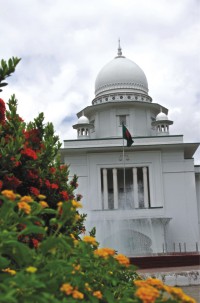|
Perspective
I Stand Amended
Nader Rahman
When it comes to the constitution in Bangladesh, nothing is sacred. Governments have treated it like Wikipedia, adding, editing and questioning it whenever it suits their purposes and for the most part the people of Bangladesh have accepted whatever has been flung their way. Last week with the High Court finally declaring the 5th Amendment illegal an unusual precedent took place as entire governments were declared illegal and their deeds and misdeeds were put under a national microscope. Never before have we had an opportunity to look back at our past and examine our complicated relationship to the constitution and how it has shaped our social and political lives.
When our constitution was created some 38 years ago, it was crafted out of the emotions of our struggle for independence, and had a lasting quality to it. It identified our ideas and ideals as a nation and more so than many other constitutions around the world pushed the issue of secularism and equality to the forefront.

The Supreme Court building. Photo: Sk Enamul Haq |
But it was only a matter of time till it was tampered with, first came one party rule and then came the largest facelift since it was codified in early '72. By 1976 the secular character of our constitution had not just been meddled with, but was completely replaced with “absolute faith in Almighty Allah.” There were numerous problems with such wholesale changes, the first primarily being that religion based political parties were allowed back onto the national political stage. The consequences of which we have been dealing with to this day.
A shift away from secularism would not only marginalise the people of other faiths, but fundamentally changed one of the tenants of our constitution. The four pillars of nationalism, secularism, democracy and socialism which made up our constitution had effectively been reduced to three, as our political structure was remodeled to suit the government of the time.
The problem is that these changes would have been easier to swallow (they still would have been nauseating) had they been enacted by an elected government. But the fact that they were enacted by a military government without the people’s mandate to hold office put them not only on shaky moral ground but also on shaky legal ground. This is where things got interesting, with their legacy in mind the 5th Amendment was enacted and it essentially validated the military governments between 15 August 1975 and 6 April 1979 and their actions (which included their constitutional wranglings). In one fell swoop blood was turned into wine and at least from a legal standpoint they now had their little piece of history to look back at.
It wasn't until the year 2000 when the owners of Moon Cinema Hall filed a writ petition regarding the handover of their property from the government in which they challenged the 5th Amendment that the issue came to light again. The seemingly innocuous case was taken up to the High Court who in 2005 issued a landmark ruling, which declared the amendment illegal. Last week the judgment was upheld but the larger question was, what now?
The answer is multi-layered, firstly from a political standpoint it only adds to the Awami League's increasing portfolio to de-legitimise Ziaur Rahman. With little things like renaming airports to undoing his history they have done everything in their power to render him a dinosaur. Whether they have succeeded is yet to be seen but along the way by removing the 5th Amendment at least they have done some good.
The trickier issue is when the topic of religion surfaces, while reverting back to secularism is obviously the correct thing to do many people view the move to be anti-Islam. That coupled with the fact that four Jamaat leaders are soon to be tried for War Crimes leaves us in a powder keg situation. The government must try to brand the word secularism not in opposition to Islam but as a complementary component. One can only hope they will do this with the utmost tact.
Internationally the United States and most of the West will probably look at the decision favourably, as a step away from incubating radical Islam. An accusation which has been levied against us by both India and the United States. If nothing else this should help Hillary Clinton add a visit to Dhaka on her next trip to the region and that should be a feather in Sheikh Hasina's cap.
But what will the enduring legacy of the decision to revoke the 5th Amendment be? That the truth will set us free? That secularism is the only way forward? That Ziaur Rahman is a national pariah? The answer is that the foundations of this country were built on the ethos of plurality and equality and no matter how long we were robbed of them in our constitution we never stopped believing in them. It's not often that this is said in Bangladesh, but this political victory (for the Awami Leage) was a moral victory for the nation.
Copyright
(R) thedailystar.net 2010
|

